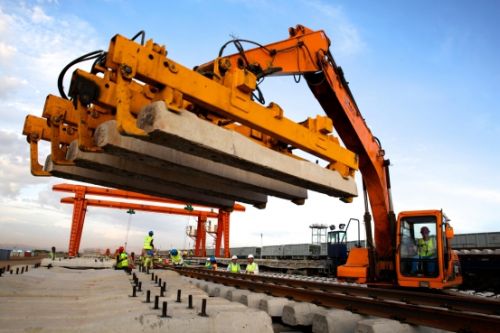
(Photo 3: People work at the construction site of the electric railway in Dire Dawa, Ethiopia on April 27, 2014. The railway links Djibouti's capital Djibouti city with Ethiopian capital Addis Ababa.)
BEIJING -- Located at the corner of the African continent, Djibouti is a small country with a population of 910,000.
With a development plan Vision 2035 announced in November 2014, Djibouti aims to build regional shipping and commercial center and the "Dubai of east Africa," in 20 years taking the geographic advantage of the Mandab Strait between the Red Sea and the Indian Ocean.
Because of the help and support of our Chinese friends, it is not just a dream, Djibouti's Minister of Economy and Finance Ilyas Moussa Dawaleh said confidently. Dawaleh said that China helped Djibouti build railways, ports, water supply facilities and oil projects, and Djibouti is willing to take the ride of the Belt and Road Initiative to realize vigorous development.
--Railway construction under tough geographic conditions
The 783 kilometers long railway between Djibouti City and Ethiopia's capital Addis Ababa is the first cross-border railway in Africa built by a Chinese company in the new era of China-Africa cooperation.
Geng Daojin, manager of China Civil Engineering Construction Corporation (CCECC)'s Djibouti unit, introduced that the Djibouti part of the Djibouti city-Addis Ababa railway built by the French 100 years ago was abandoned, from ordinary people to the president are all hoping for a new railroad.
I am grateful that China has made the reopening of our railway possible, said Djibouti president Ismail Omar Guelleh at the completion ceremony of rail laying for the Djibouti part of the railway.
After the railway is completed, travel time from Djibouti port to Addis Ababa is reduced to some ten hours, and a cargo train can take 3,000 tonnes to 5,000 tonnes of goods while 100 trucks together can transport 3,000 tonnes of goods in three days.
Since November 18 of 2015, a diesel locomotive of the Chinese company for the railway construction has been running on the electric railway transporting international aid food to Ethiopia, where is seriously affected by the El Nino. Since then, 35,625 tonnes of food have been transported.
Although the Djibouti part of the railway only extends for 78 kilometers, if you look at the landform you may imagine how hard the construction was, said Chinese employee Lv Yanjie, showing local workers how to do ballast trimming on a railway bridge. He said the workers are all from villages around the project and get along well with Chinese employees. They are proud to work for a Chinese company and take good care of the shoes and gloves given by the company.
--Undertaking social duty earns local respect
In Djibouti, if you mention that you are related to the Chinese companies that build ports and railways here, the locals would probably give you green light on everything.
The tropical desert climate with less than 150 mm of annual precipitation on average results in freshwater shortage in Djibouti. To solve the problem of water supplies, China also had sent drilling teams, but the result is not ideal.
The Ethiopia-Djibouti cross-border water supply project was promoted by the government of Ethiopia, Djibouti and China in 2012, designing to obtain water from Ethiopia, to provide drinking water for people in Djibouti through cross-border water pipes to relieve the shortage of fresh water resources.
As the programmer, China's CGCOC Group is responsible for the overall planning, construction and management. Upon completion, it can provide 100,000 cubic meters of high quality drinking water for five main towns in Djibouti, about 750,000 people accounting for 85 percent of the population of Djibouti are directly benefited.
As the water pipes need to go over several highlands in Ethiopia and the water sometimes needs to be drawn from low to high, which makes the project extremely difficult. Before Chinese company undertook the project, I don't believe there will be able to complete, said a customs official of Djibouti.
(Source: the People's Daily)




 A single purchase
A single purchase








